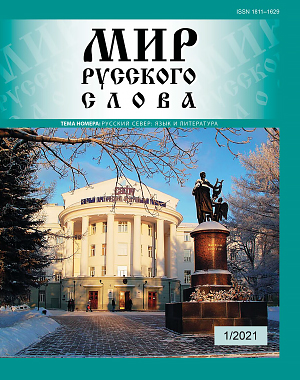Poetics of the Apocalypse: “Cursed Days” by Ivan Bunin
DOI:
https://doi.org/10.24412/1811-1629-2021-1-55-62Abstract
The author argues that the diary entries “Cursed Days” by Ivan Bunin remain nowadays among the little-studied works, and it determines the relevance of the article’s task: to study the linguistic features of this work. While interpreting the revolutionary era, the writer interprets everything that happens as the death of the Russian land. To implement his plan, Bunin repeatedly refers in his diary to the plots and motives of the New Testament’s “The Revelation to St. John the Evangelist”, better known as “Apocalypse”. A stable semantic connection is realized at the linguistic level, which allows to speak about the “poetics of the Apocalypse,” which is a certain system of linguistic units embodying this parallel. As author’s observations have shown, one of the leading ways of connecting the “Cursed Days” with the text of Scripture is quotation. The quotes play, fi rstly, the role of digressions, conveying Bunin’s feelings and his individual attitude to revolutionary events, and secondly, play a role of the semantic basis for the implementation of more complex implicit mechanisms of the interaction between the writer’s narrative and the biblical text. According to the research results, the most frequent in this respect are synonymous and associative connections of words, the use of the units of the same thematic group, and metaphorical transfers.
Keywords:
Ivan A. Bunin, “Cursed Days”, Apocalypse, citation
Downloads
References
Библия. Книги Священного Писания Ветхого и Нового Завета. М.: Российское библейское общество, 2012. 1407 с.
Литература
Серия Гуманитарные науки. 2015, (18, вып. 27): 87–94.
References
Downloads
Published
How to Cite
Issue
Section
License
Articles of "The World of Russian Word" are open access distributed under the terms of the License Agreement with Saint Petersburg State University, which permits to the authors unrestricted distribution and self-archiving free of charge.




